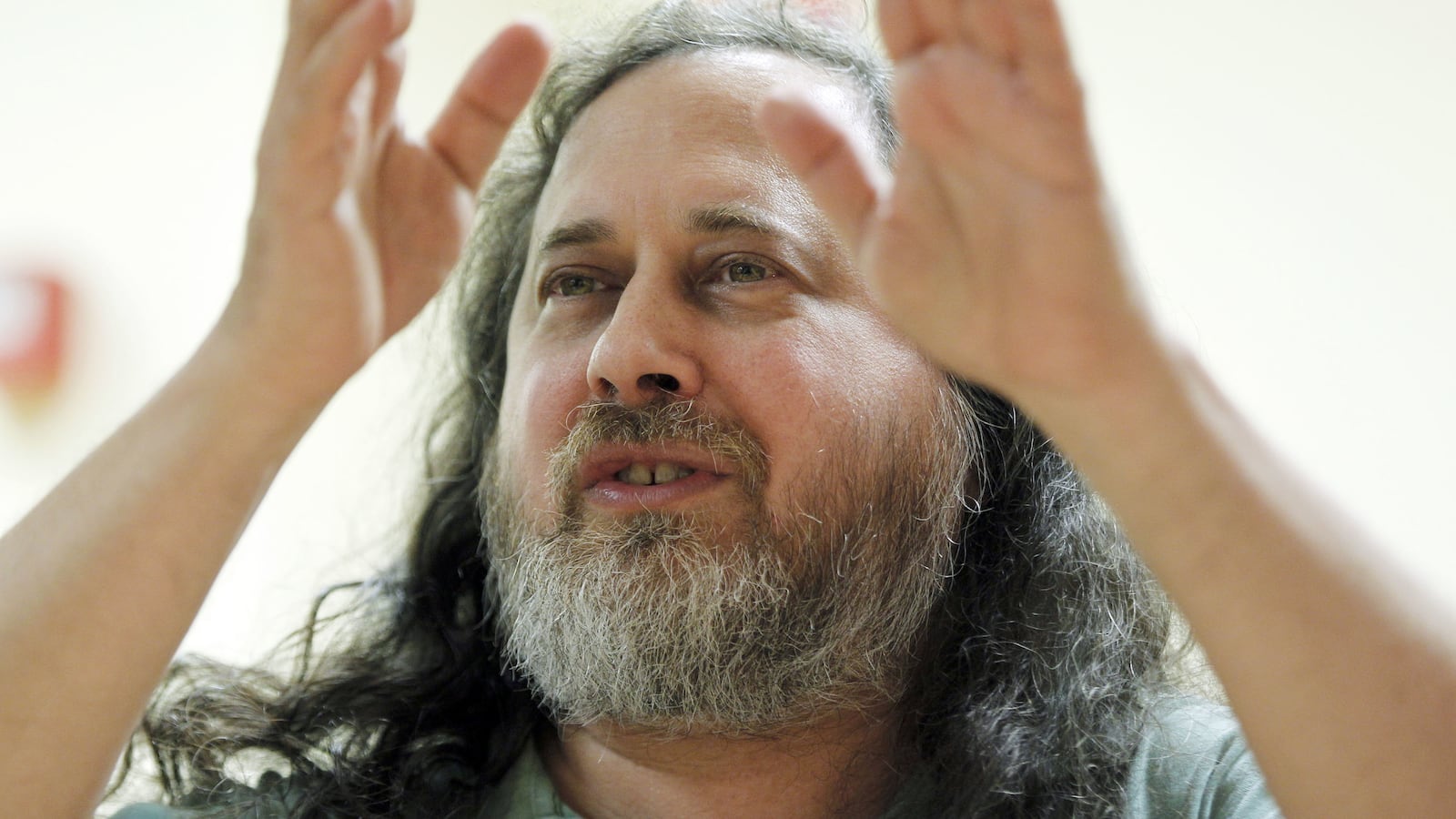While MIT engages in damage control following revelations the university’s Media Lab accepted millions of dollars in funding from Jeffrey Epstein, a renowned computer scientist at the university has fanned the flames by apparently going out of his way to defend the accused sex trafficker—and child pornography in general.
Richard Stallman has been hailed as one of the most influential computer scientists around today and honored with a slew of awards and honorary doctorates, but his eminence in the academic computer science community came into question Friday afternoon when purportedly leaked email excerpts showed him suggesting one of Epstein’s alleged victims was “entirely willing.”
An MIT engineering alumna, Selam Jie Gano, published a blog post calling for Stallman’s removal from the university in light of his comments, along with excerpts from the email in which Stallman appeared to defend both Epstein and Marvin Minsky, a lauded cognitive scientist and founder of MIT’s Artificial Intelligence Lab who was accused of assaulting Virginia Giuffre. Giuffre has alleged that sex offender and financier Epstein trafficked her to powerful men for sex, including Minsky, who died in 2016. She’s alleged that Epstein and his alleged madam Ghislaine Maxwell recruited her at Mar-a-Lago when she was 16 years old.
Stallman wrote that “the most plausible scenario” for Giuffre’s accusations was that she was, in actuality, “entirely willing.” Vice’s Motherboard later reprinted the emails in full. Gano did not immediately respond to a request for comment.
Stallman also wrote in the email exchange that “it is morally absurd to define ‘rape’ in a way that depends on minor details such as which country it was in or whether the victim was 18 years old or 17.”
A deep dive into his writings shows this isn’t the first time Stallman has expressed such questionable views, however. He has written dozens of posts on his personal website in favor of legalizing pedophilia and child pornography for more than 15 years.
“This ‘child pornography’ might be a photo of yourself or your lover that the two of you shared. It might be an image of a sexually mature teenager that any normal adult would find attractive. What’s heinous about having such a photo?” Stallman wrote in 2011 on his personal site, stallman.org, in an argument in favor of Congress limiting laptop searches at the U.S. border.
Stallman currently works as a visiting scientist at MIT, according to the website of the university’s Computer Science and Artificial Intelligence Lab (CSAIL), and as the president of the Free Software Foundation, which he founded in 1985. Stallman has been seen as a pioneering computer scientist for decades, especially in his creation of and advocacy for new kinds of freely available software. Much of his work underpins modern computer science. He’s worked at MIT on and off since the 1980s, and he spoke at a Microsoft computer science research center just last week. The Free Software Foundation, Microsoft, and MIT did not immediately respond to requests for comment on Stallman’s remarks.
Stallman also did not respond to a request for comment from The Daily Beast.
Stallman commented on the news of Epstein at length on his personal site. In April of this year, the programmer wrote of one story, “I disagree with some of what the article says about Epstein. Epstein is not, apparently, a pedophile, since the people he raped seem to have all been postpuberal.” He preferred to call Epstein a “serial rapist.”
Chafing at the idea of a legal age of consent was a favorite theme of his, per his earlier blog posts. In 2003, he said, “I think that everyone age 14 or above ought to take part in sex, though not indiscriminately. (Some people are ready earlier.)”
Alan Dershowitz, one of the lawyers who helped broker Epstein’s 2008 sweetheart plea deal, has also argued against age of consent laws, calling statutory rape an “outdated concept” in a 1997 op-ed and suggesting on Twitter in July that a 16-year-old should have the “constitutional right” to consensual sex.
Stallman was apparently also quite open about his ideas not only on age of consent laws, but also pedophilia. In 2006, he wrote, “I am skeptical of the claim that voluntarily pedophilia harms children. The arguments that it causes harm seem to be based on cases which aren't voluntary, which are then stretched by parents who are horrified by the idea that their little baby is maturing.” The law does not allow for “voluntary” pedophilia.
In 2006, he said it wouldn’t so bad for an adult man who worked for the Department of Homeland Security to have sex with a 14-year-old, as one government employee had allegedly propositioned: “Supposing she had voluntarily had sex with him, presuming that they used a condom and suitable contraception, it would have done no harm to either of them.”
He reiterated his point in 2013: “There is little evidence to justify the widespread assumption that willing participation in pedophilia hurts children.”
People within the tech industry knew of Stallman’s remarks, chattering about his controversial claims in social networking sites and forums at least since last year, but his remarks about Epstein’s victims reignited the debate Friday. The digital trail of Stallman’s remarks and the whisper network surrounding them raise the question of whether MIT and the Free Software Foundation knew of his controversial statements.
Stallman’s permissive streak extended to all varieties of illegal sexual behavior. In 2003, he wrote a post about a judge who argued that repealing an Alabama anti-sodomy law would lead to the legalization of "prostitution, adultery, necrophilia, bestiality, possession of child pornography, and even incest and pedophilia.” The computer scientist responded, “All of these acts should be legal as long as no one is coerced. They are illegal only because of prejudice and narrowmindedness.”
Stallman extended his argument to say that internet censorship is worse than child pornography: “The term ‘child pornography’ is dishonest. The censorship of it puts young lovers in direct danger of prosecution. Many published works are disgusting, but censorship is more so.”
And in 2011: “Even when it is uncontroversial to call the subject depicted a ‘child,’ that is no excuse for censorship. Having a photo or drawing does not hurt anyone, so and [sic] if you or I think it is disgusting, that is no excuse for censorship.”
MIT has been rocked in recent weeks by scandals arising from its connections to Epstein. The director of the vaunted MIT Media Lab, Joichi Ito, resigned after the New Yorker reported he accepted more money from Epstein than he disclosed and that he had concealed the donations from both the university and the public. The president of MIT, L. Rafael Reif, ordered an independent investigation, which revealed that he, too, had taken part in hiding Epstein’s donations. Reif is facing calls to step down after acknowledging that the Media Lab accepted funds from Epstein long after his 2008 conviction for soliciting a minor for prostitution, with Reif’s own signature found on a 2012 note thanking Epstein for his generosity to the university.







